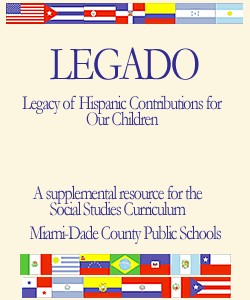LEGADO
Inasmuch as commercially published history books include little or nothing regarding the contributions of Hispanics, as inasmuch as history lessons need to be infused within the context of the historical period of time, it is necessary to develop a curriculum that will infuse the contributions of Hispanic with the Social Studies curriculum. In order to In 1996, President Clinton's Proclamation of National Hispanic Heritage Month, further describes the importance of this curriculum.
achieve a true infusion, it is necessary to review and revise as appropriate the Social Studies Competency-Based curriculum and to develop an implementation plan with a curriculum guide and staff development activities."
On November 19, 1997, the School Board of Miami-Dade County with the leadership of Demetrio Perez, Jr., Vice Chair, requested for the:
"authorization to include in the Board-approved 1998 Legislative Program an amendment to section 233.061, Florida statutes, to include as a requirement the study of Hispanic contributions to the history of the United States and to establish a Hispanic Heritage Advisory Committee."
The Board item describes the nature of this amendment and the reasons for developing Legado: Legacy of Hispanic Contributions for Our Children:
"In 1994, the Florida Legislature amended Section 233.061, Florida Statutes to require instruction in the history of African-Americans and the Holocaust. Inasmuch as Hispanic constitute a significant percentage of the population in the State of Florida, and in light of the historical importance of Hispanics to the history of Florida and the United States, the inclusion of the study of the Hispanic contributions to history of the United States should be required following the pattern established for African-American history and the study of the Holocaust.
Click here to download
the full-text version of "Legado"![]() Adobe PDF File - 1.2 MB
Adobe PDF File - 1.2 MB

"Hispanics, who have long been part of this tradition, were the earliest European settlers of this great nation, with the Spanish founding cities in Florida in the 1500's, and Mexicans establishing homesteads in the Southwest in the 1600's. Puerto Ricans became U.S. citizens in 1917, and other Latinos over the years, including Cubans and Central Americans, came to the United States in search of democracy, freedom, and a better way of life. Hispanics, who are of all races, distinguish themselves as a community by fostering connections rooted in the Spanish language. Their diverse and vibrant culture includes elements originating in Spain, North America, Central America, South America, and the Caribbean. Hispanic share deep family values, recognize their obligations to the less fortunate in our society, protect their children, cherish freedom, and fulfill their patriotic duty to defend their country."
Hispanic children, totaling approximately 12 millions, are the second largest group of children in the United States. Hispanic is the fastest growing minority in the nation and soon, may be the largest group of children in the United States. Therefore, integrating Hispanic American contributions into the Social Studies curriculum is a worthy and important goal for all schools. This goal will help develop cultural pride, self-esteem, and respect for diversity. Studies suggest that positive ethnic affiliation among Hispanic Americans greatly influences individual development in many ways, including: lifestyles choices, values, opinions, attitudes, and approaches to learning. Yet, it is not enough for Hispanic American students to learn only about their own cultural heritage and history. All students must learn to appreciate and respect other cultural groups and to develop ethnic literacy. This will allow students to understand their uniqueness, the complexities of ethnicity and culture, and to take pride in which they are as people.
Miami-Dade County Public Schools has taken the first steep toward this goal by developing Legado: Legacy of Hispanic Contributions for Our Children as a supplemental resource for the social studies curriculum
"It is hoped that the infusion of these important contributions will assist teachers in developing our student's culture and awareness for the uniqueness of others."
